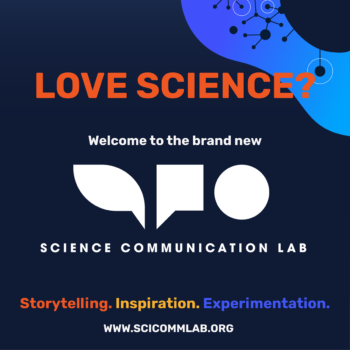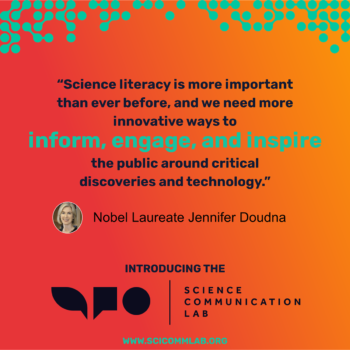The team behind the open-access iBiology educational videos you know and love has received an NSF grant to create new multimedia science educational content. Learn more about the new nonprofit Science Communication Lab below!

The team behind the Emmy-nominated HUMAN NATURE and PICTURE A SCIENTIST films has received a 3-year multi-million-dollar grant from the National Science Foundation (NSF) to create multimedia educational content about the journey and wonder of science. Part of the nonprofit Science Communication Lab, the newly funded work includes a series of short films about novel breakthroughs and techniques that highlight diverse voices in science, as well as virtual workshops to train early-career scientists in effective science communication.
“The Science Communication Lab is bringing together the best of science storytelling in the film world through its Wonder Collaborative productions, along with the best of video content for science education through its renowned iBiology work,” says Daniel Colón-Ramos, a professor of neuroscience and cell biology at the Yale School of Medicine who sits on the Board of the Science Communication Lab. “The new NSF grant enables the Science Communication Lab to continue its innovative work in science filmmaking and education, as well as create new partnerships and novel methods for evaluating the impact of its content — all the while emphasizing the importance of diversity, equity, and inclusion in STEM.”
The Science Communication Lab’s Wonder Collaborative is notable for its work on the documentaries HUMAN NATURE, which has received three Emmy nominations, and PICTURE A SCIENTIST, which has toured the world through 1500 institutional screenings. Both now streaming on Netflix, the films highlight the power of film in showing the process and culture of science in new ways.

In selecting HUMAN NATURE as a “Critic’s Pick,” the New York Times wrote: “Every ‘Oh wow’ in HUMAN NATURE is matched by an ‘Oh no’ somewhere down the line. Together, these two competing emotions — excitement and unease — make for one pretty fascinating documentary.”
For more than a decade, the Science Communication Lab’s iBiology has broken new ground in science education and professional development across multiple levels of training. They have produced hundreds of freely available videos that showcase diverse scientists and novel breakthroughs in science, in addition to online video-based training courses and educational resources
The new NSF grant will take the educational video content to the next level, experimenting with a variety of styles to create the highest impact for 30 new films over the next three years. The work will include new methods of evaluation, such as real-time feedback of the films through new applications in development with researchers at the University of Wisconsin-Madison.
“With the new grant, the Science Communication Lab will expand its work across filmmaking and education to reach broad and diverse audiences,” says Nobel Laureate Jennifer Doudna, whose groundbreaking co-discovery and development of CRISPR technology is featured in the film HUMAN NATURE. “Science literacy is more important than ever before, and we need more innovative ways to inform, engage, and inspire the public around critical discoveries and technology.”
This grant is the latest in a series of grants and strategic partnerships that have enabled the establishment and growth of the Science Communication Lab. For several years, the National Institutes of Health has supported the development of courses that lay out best practices for experimental design and other research dimensions featured on a custom course platform. Using this platform, the Science Communication Lab has worked with the Chan Zuckerberg Institute to create custom training for physician-scientists to learn about research. In another strategic partnership, the Howard Hughes Medical Institute is supporting the creation of interactive, open-access resources for undergraduate biology students.
—
The Science Communication Lab is an innovative non-profit organization dedicated to using multimedia storytelling to engage the public, including educational and scientific communities, in the journey and wonder of science. The Science Communication Lab is rooted in a ground-breaking partnership between the worlds of science, education, and filmmaking.
The Science Communication Lab’s filmmaking arm includes the Wonder Collaborative, which is reinventing science filmmaking to highlight the wonder, awe, and diversity of discovery through feature-length and short films and innovative distribution networks.
The Science Communication Lab’s education arm includes iBiology and the Explorer’s Guide to Biology. iBiology offers open-access free videos that bring the excitement of modern biology out of the lab and into the classroom. Explorer’s Guide to Biology is a new initiative to reimagine resources for undergraduate college biology courses.
Learn more at: www.sciencecommunicationlab.org





Leave a Reply